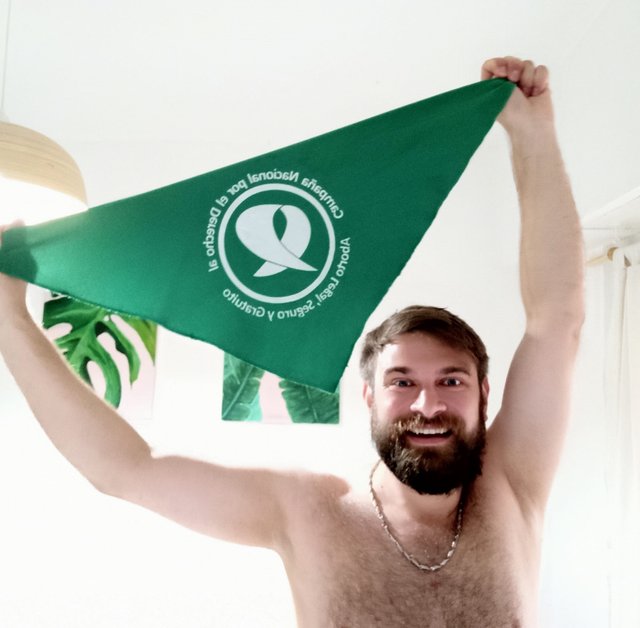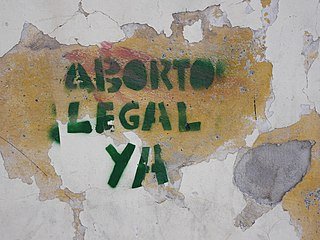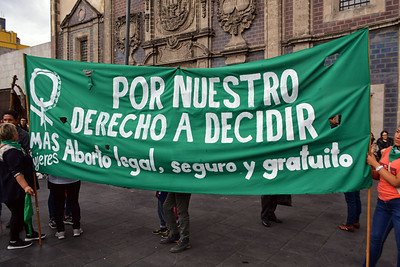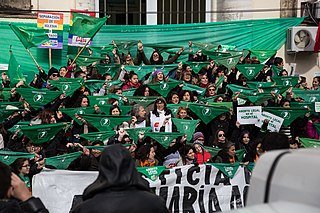The new abortion law in Argentina, history of the change from January 2021 by @papi.mati
Intro

This article was written by me on the 26th of January and published in the Polish newspaper "Zielone Wiadomości" (electronic version of the newspaper still available on their website for free to read and/or download). I sometimes publish some stories from South America there pro bono.
As it was published in Polish, presented below English version remains #steemexclusive
The article is very informative, like the journalist I am trying to not take any side and present the "arguments" of both sides equally, although being 100% neutral is nearly always impossible. I am pro-choice, but hopefully, it's not that obvious from the article and I managed to give enough space for antiabortionist quotes too. You can let me know if I succeed with that after reading the article.
As the article is about some controversial things, I would like to remind you that conversation in the comment section requires being cultural and respectful. It's not Twitter or Facebook, it's steemit, so let's all keep it decent ;)
New abortion law in Argentina
On January 24, 2021, a new abortion law came into force in Argentina, allowing for termination of pregnancy up to 14 weeks and later if it is a result of rape or threatens a woman's life or health. Thus, Argentina became the fourth country in the region with access to legal abortion, after Cuba (1965), Guyana (1995), and Uruguay (2012). However, the road to legislative changes was neither easy nor fast.
The prior abortion law was in force from 1921 and was one of the most restrictive in the Americas. It assumed, just like in Poland after the recent changes, the possibility of terminating the pregnancy only when it would endanger the health or life of the mother and in the event of rape. Underground abortions and deliberately causing a miscarriage could lead to imprisonment of up to 4 years and up to 15 years for the doctors performing the procedure. Every year 370,000 - 520,000 treatments were performed in hazardous conditions (data from 2005, the latest official survey on the scale of the phenomenon). Archaic law, however, not only criminalized the practice but also posed a direct threat to women's lives. Every fourth perinatal death was a consequence of an underground abortion.
The beginnings of the struggle to liberalize the draconian law date back to the 1970s and the first feminist movements in Argentina, but the turbulent political turmoil, Peronism, military dictatorship, and democratic transformation left no room for a general debate. The topic remained muted almost until the end of the '90s.
In 1998, at the invitation of the controversial president Carlos Menem (now one of the senators), who, inter alia, He pardoned the leaders of the criminal military junta, Pope John Paul II came to Argentina, and his visit coincided with the first public debates on abortion. Officially, the leaders did not talk about reproductive rights, but after the Pope's departure, Carlos Menem prepared a special document in which he made the protection of the conceived life a priority of Argentine politics, and in his statements to the media he even referred to himself as an opponent of contraception. The chances of any change by the end of the millennium remained lost.
The next president, Fernando de la Rua, never officially spoke about abortion. His term in office fell on the worst economic crisis in the history of the country, so the president's entire attention was focused on the economy. Without much success. De la Rua had to evacuate from the presidential palace by helicopter because the enraged crowd aggressively demanded his resignation.
Only Nestor Kirshner, although he was a Catholic (but leftist), announced in 2005 that he would start work on a new law. It was already known then that it would probably not be discussed during his term of office. Kirshner's announcement and the appointment of the judge of the Supreme Court of the first woman in the history of this office (Carmen Argibay, advocate of access to legal abortion) put reproductive rights at the center of a public dispute with the Catholic Church, which openly criticized the desire for any change.
A year later, the country was shocked by two rapes of women: the first involved a 19-year-old girl with intellectual disabilities, a resident of Buenos Aires. Her mother noticed that she was pregnant and reported to the hospital requesting a legal abortion. According to the procedures, a special committee was set up, but the judge who headed it waited until the last moment to issue a permit and then refused access to the procedure, citing personal beliefs. The refusal was revoked by the second instance, but it was too late for an abortion.
The second case, in a very short period of time, was in the Mendoza region and involved a raped 25-year-old girl with a physical and intellectual disability. Here, one of the Catholic legal institutions tried to block a license to perform a legal abortion. the request was revoked in time and the legal abortion was completed on time.
Both events led to a special statement condemning fanaticism and circumvention of the law, which was signed by almost all the health ministers of the individual provinces (except for two people). In response, that same year, the Argentine Episcopate issued a special document in which he wrote about the need to give value to every conceived life and expressed his fear of "sowing a culture of death in Argentina."
Abortion law has become number one in all ideological disputes in the country.
When Nestor Kirshner resigned from re-election in 2007 and his wife, Cristina Kirshner won the election, it turned out that work on the new abortion law had been abandoned, and Cristina herself, although very progressive on the issues of LGBT rights and in-vitro reimbursement, is opposed to introducing changes to the Act of the 1920s. In response to this unexpected twist, more than 250 NGOs created the National Campaign for Legal, Safe and Free Abortion, which started educating the public by conducting panel discussions, organized annual demonstrations (up to 200,000 people marched on the largest one) and, most importantly, each year submitted to Congress a citizen's draft law providing for legal abortion up to 12 weeks pregnant. In total, it submitted 12 such projects. For ten years, Congress avoided voting on Campaign proposals, arguing that Argentina already had a legal abortion in selected cases, and that should be more than enough.
That same year, there is a significant polarization among Catholics. Numerous organizations are established to protect life from conception, which the Pope himself thanked several times for their activities, and the supporters of the liberalization of the law create the Organization of Catholic Women with the Right to Decide.
Ironically, the chance for change came under the right-wing president, Mauricio Macri, who took over from Kirshner. Macri allowed a vote on the citizens' bill in 2018, pledging to sign it regardless of personal views if it won the majority of votes.
The vote in Congress ended with a slight majority of the supporters of the changes (129 votes "for", 125 "against"), but the bill was rejected by the Senate (31 votes "for", 38 votes "against", 2 senators absent). The main arguments of the opponents could be divided into two groups: religious, referring to the need to protect life from conception, and legal, saying that abortion is contrary to the Argentine constitution and international law and would have to win at least two-thirds of the votes of Congress instead of the usual most.
When the Senate rejected the new law, in Jujuy Province, one of the most conservative in the country, a 12-year-old girl was repeatedly raped by her 60-year-old neighbor. She did not tell her parents about it, but when she complained of severe abdominal pain and was taken to the hospital, the first tests showed that she was pregnant. The parents demanded an abortion, but conservative authorities delayed the issuing of the permit for so long that it was too late to legally terminate the pregnancy. In addition, after a few months, at the time when the child was to give birth, the provincial governor personally ordered a cesarean section, taking away the decision of the pregnant woman and explaining it with the need to protect the newborn, who died a few hours later. The case shocked the whole country. Since then, as a sign of opposition, many people have started wearing green scarves as an element of clothing, the symbol of feminist and pro-choice movements known today. They began to be hung at home, attached to backpacks, and today, two years after those events, even the president of the country wears a green tie to emphasize the urgent need to fight for women's rights. Unfortunately, the situation of forcing children to give birth, especially in the northern regions of the country, has never ended.
The vast majority of Argentinian society began to support access to safe, and free abortion. In October 2019, Dozer, the famous freestyle Rapper and the Pro-lifer, who in 2019 competed in the largest freestyle competition in the country with 17-year-old feminist rapper, María del Rosario Flores, known as Roma, learned about it painfully. Beat quickly moved to the issue of abortion, and the crowd of 15,000 almost unanimously dethroned last year's champion and awarded the girl the victory. The footage of this skirmish turned viral. A month later, history repeated itself in Mexico, pointing to a broader trend beyond Argentina's borders in the region.
In 2020, President Alberto Fernandez, who in his election campaign promised that ensuring access to legal abortion would be his priority, proposed his law allowing termination of pregnancy up to 14 weeks and after 15 weeks, when it would endanger the health or life of a woman or would the effect of rape. The doctor would be able to rely on the conscience clause and refuse to perform the procedure, but it would then be his responsibility to find a doctor in the vicinity who would perform the procedure. The bill passed through Congress and was to be processed by the Senate in December.
Feminist movements organized vigils in the largest cities, large screens were prepared in parks, where the deliberations were broadcast live. It was feared that the bill could be rejected this time as well because the Senate was composed of the same people who had blocked the changes almost two years ago. It was also not without significance that the Catholic Church was intensively involved in the anti-abortion campaign. Pope Francis has spoken on the subject several times, causing pressure, especially on senators representing the more religious, northern provinces.
The debate lasted over 12 hours.
Opponents of the changes repeated the argument from two years ago that the law was unconstitutional. Jose Mayans said he was in favor of the extension of women's rights as long as they do not restrict the rights of other people, in this case, a conceived child. The state cannot allow a child to be killed by Argentine and international law. Silvia Elias de Perez went even further, stating that abortion is murder and therefore runs counter to every existing constitution in the world. The state has no right to decide who lives and who does not. Senator Perez was supported, among others, by Julio Cobos, who called the fetus "a person in a pregnancy state", Claudio Poggi ("the right to life prevails over every other right. If we question it, what might happen in the future?"), Antonio Rodas and Pablo Blanco ("The unborn child is independent of the pregnant mother. The law is selfish. It does not take into account the rights of the child or the father").
Some admitted that changes were needed, but could not agree to the full legalization of abortion. Esteban Bullrich suggested stopping the imprisonment of women for terminating pregnancies, Claudio Poggi reducing the bureaucracy of adoption law and creating the possibility of adopting the unborn, and Roberto Basualdo focusing on proper sex education and preventive measures.
Many opponents of the changes emphasized that the time when the debate was launched was very unfortunate. Argentina is struggling with coronavirus and a huge financial crisis. Laws that divide society are now particularly inadvisable (Poggi, Basualdo, Zimmermann). Some also suggested that the changes were not supported in most provinces, they were just a wish of the people of Buenos Aires (Maurice Closs).
Maria Belen Tapia, in a widely commented statement, noted that 16-year-olds in the country cannot legally buy cigarettes or alcohol, and thanks to the new law, they will be able to decide on their own to terminate the pregnancy, while Mario Fiad called the attempts to approve the law "a loud failure of the state" and added: "Since we could not guarantee the safety of women, because we could not prevent the exploitation of girls, we offer them an abortion ..."
The most controversial statement was made by Dalmaco Mera, who in his incoherent speech compared abortion with the fourteenth-century pig slaughter, called the law extreme, and stated that it would result in the creation of landfills with unborn children.
Proponents emphasized that since the previous deliberations of two years ago, 80 women have died from illegal abortions ("I vote for that we never have to go back to hangers, basements and secret garages again. So that we never have to die of illegal abortions again." - Nancy Gonzalez) that the prohibition of abortion does not reduce the occurrence of the phenomenon (Stella Maris Olalla)
Many people emphasized that it was impossible to force women into motherhood (Norma Durango: "unwanted motherhood is not a good motherhood." Guadalupe Tagliaferri: "We cannot force anyone to go through life as we believe they should go" ), and supporting ideology cannot take place at the expense of women (Pamela Verasay)
Martin Lousteau said that supporters of the new law recognize that it poses some dilemmas, but it is the woman who should have the sole decision-making body by week 14. He stressed that there are 11 million women of childbearing age in Argentina. If the bill concerned any other social group of 11 million citizens, the MEPs would double and go to great lengths to ensure equal rights for them. Why is it not like this now? Because we continue to discriminate against women as a society. "
María de Los Ángeles Sacnun emphasized: “It is unacceptable reductionism to believe that it is about abortionists or anti-abortionists. The only subject of discussion is whether the state will accompany women who decide to terminate the pregnancy. " She recalled the case of Ana María Acevedo in 2006: “She was denied a legal abortion. She had three children. She had cancer and needed immediate treatment. She died. "
Daniel Lowera spoke in a similar vein, who additionally emphasized that the problem of dangerous illegal abortion mainly affects people with a lower economic status, therefore the state should intervene based on egalitarianism to equalize the chances. Mariano Recalde echoed her: “The government has a duty to care for the lives and health of women. About 1,000 treatments are performed illegally every day. What we are discussing here is whether they can be performed legally, safely. The Act does not promote or encourage abortion. She grants women rights that we have ignored for years. I am in favor of sex education to make informed decisions, for contraceptives to avoid abortion and for legal abortion to avoid death. " The senator also thanked the women's movements who pushed the government into a debate on this topic.
The statement of 71-year-old Silvio Sapag was very moving and strong in tone: "I come from the times when girls were refused university studies because they had to focus on looking for a good husband. We couldn't vote, we couldn't have a bank account, we didn't have parental responsibility for our children. When I was born, women were nobody. Today we do not believe that a woman has the ability to make decisions, idealistic pregnancies are forced, causing psychological, spiritual, and physical harm to girls and young women who are denied a choice. That is why we come to say enough! Enough of inquisitive treatment! " She stressed that the changes came about thanks to feminist movements and some politicians. She thanked Evita Peron and Cristina Kirschner.
The equally widely commented statement was made by another supporter of legislative changes, Senator Gladys Gonzalez, who was pregnant during the previous vote in 2018. She admitted that she received a lot of threats and insults right after the vote, and when she had a miscarriage two days later, she thought God punished her for voting for legal abortion. The thought only lasted a few seconds, though, and then she realized it was a medical matter, not a religious one. Gladys touched on the sense of guilt that the Catholic Church instills in us throughout our lives. She emphasized the importance of sexuality education free from religion.
In addition, Alfredo Luenzo stated that the debate revealed how many sexists there are in society, men feel they are losing power and will do anything to prevent it, Roberto Mirabella noted that pro-life defenders only defend embryos, leaving children without food and wandering without help. on city streets; Ana Almirón unequivocally called forcing a woman to give birth to a form of torture. She stressed that in her province (Corrientes), girls aged 10, 11, and 12 are forced to deliver pregnancies; Matias Rodriguez called for the elimination of individual, cultural, and religious prejudices and for necessary, urgent changes to the law, and Eugenia Catalfamo during her speech quoted Ana Correa's book Somos Belén, which tells the story of a young woman from Tucuman who was imprisoned for spontaneous abortion. “I have read and read this book several times and asked myself if" we are all Belén "and the truth is that we are not because some of us have a choice. Because we have other options. " She emphasized that legal abortion equates the chances of the poor and the rich.
The most important, however, were the statements of people who changed their minds from 2018 and decided to support the act liberalizing the adoption law.
Sergio Leavy, the undecided senator, said he would support the new law. “I realized that this law does not enforce abortion, it does not promote abortion, it simply gives a legal and safe possibility to perform it. If my vote helps save at least one woman's life, I will vote for a change. This is what God and the people expect from me. "
Lucila Crexell: “The 2018 rejection did not change anything. Women continued their illegal abortions in hiding, loneliness, and feeling threatened. I didn't change my beliefs, but my approach to the matter. It's not about religion or feminism. It is about illegal practices that kill, hurt, and write sad stories. The new law will not change anything in the lives of the opponents of abortion, because they will never have to take advantage of it. "
Silvina García Larraburu, an opponent of change two years ago, said: "My vote is for a free woman who can act, who can decide her own conscience, no one tells her what to do with her own body." She brought up the case of Marina, "a woman like any other". After detailing the difficult process that Marina had to face due to her unwanted pregnancy, she noted: “The end of Marina's story is different from what we imagine. She had her savings and was able to access a covert operation that miraculously went well. Marina cried, fell into depression, but managed to heal, start a family (...) is alive, and has a future ahead of her. We know thousands of women who were not as lucky as she was, who died or lost their ability to procreate as a result of an illegal operation. Marina believes deeply in God, but a truly merciful God. I dare not judge anyone else, because only those who were in her shoes can understand what it feels like. " The Senator emphasized that she understood that apart from her personal position and belief system, we were dealing with a problem that required a public approach.
In the morning there was a vote. 38 voted for the changes, 29 voted against and one abstained. A new law has been made. Cheers and shouts of joy spread across the country. The president signed the law shortly after, as anticipated. Since January 24, Argentina has moved from the group of countries with the most restrictive abortion laws to the group of the most progressive countries in the region.
Thank you for reading,
@papi.mati




.jpg)
Great article. Abortion will always be a controversial topic, but not for that taboo. I believe that, as human beings, we are free to make decisions, and in this framework the women's movements have achieved a lot. Of course, it is a matter of perceptions. Kind regards.
#affable #venezuela
True. This is a topic where changing the opinion is nearly impossible, as both sides use the same arguments (basic human rights, human freedom) but disagree philosophically where being the human begins. Discussion about it started in ancient Greece and I'm sure it won't end for the next hundred of years.
I believe there is a huge difference between zygote in the early stadium and human being, ergo freedom of the woman is much more important and nobody should have any right to tell her what she should do with her body. That body belongs to her, not to the government, husband, church or any other community.
Unfortunately, while in Argentina everything goes in a good direction, in my homeland, Poland, populist government basically banned abortion recently... I may write about it some day to explain how did it happen.
Thank you for your great comment and reading my post!
#onepercent #twopercent #argentina
Thank you for sharing in Writing and Reviews! We appreciate a lot your engagement with this community.
We’d love to hear more from you!!